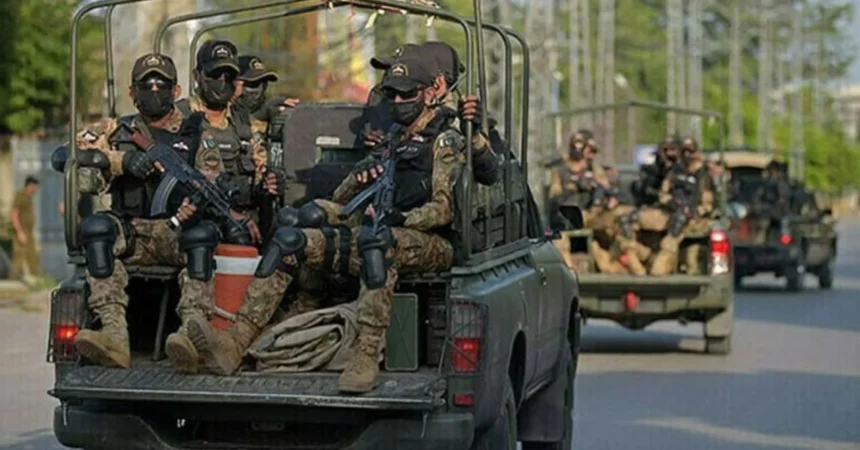In a significant counter-terrorism operation, the Counter Terrorism Department (CTD) of Punjab has successfully apprehended seven individuals associated with the militant group Fitnah Al-Khawarij. This operation, conducted across various cities, reflects the government’s ongoing efforts to combat terrorism and ensure the safety of its citizens. As the security situation evolves, the implications of these arrests raise important questions about the future of counter-terrorism efforts in Pakistan.
CTD Operation Overview
In a significant counter-terrorism operation, the Counter Terrorism Department (CTD) of Punjab has successfully apprehended seven individuals associated with the militant group Fitnah Al-Khawarij. This operation, conducted across various cities, reflects the government’s ongoing efforts to combat terrorism and ensure the safety of its citizens. The arrests signal a renewed commitment to tackling extremism and maintaining public order in the face of evolving threats.
Targeting Fitnah Al-Khawarij
Fitnah Al-Khawarij, a group known for its radical ideologies and violent activities, has been under scrutiny by law enforcement agencies for its role in promoting terrorism in Pakistan. The CTD’s latest operation aimed to dismantle the group’s network and disrupt their plans, which posed a significant risk to the region’s stability. Authorities believe that these arrests could lead to further intelligence gathering, potentially uncovering additional operatives and preventing future attacks.
Broader Counter-Terrorism Efforts
The successful apprehension of these individuals underscores the broader counter-terrorism strategy employed by the Pakistani government. Following the surge in extremist violence in previous years, security agencies have intensified their operations, employing intelligence-driven approaches to target known militant groups. This proactive stance not only aims to neutralize immediate threats but also seeks to build a safer environment for the public. Furthermore, it reflects the government’s recognition of the importance of a multi-faceted approach, combining military action with community engagement and rehabilitation efforts.
Despite these successes, Pakistan continues to face numerous challenges in its fight against terrorism. The complex landscape of militancy, driven by ideological, economic, and political factors, complicates counter-terrorism efforts. Additionally, the need for sustained intelligence and inter-agency collaboration remains critical to effectively countering threats. As militant groups adapt and evolve, law enforcement must remain vigilant, continuously refining their strategies to address the root causes of extremism and prevent the resurgence of violent ideologies.
The Future of Counter-Terrorism
As the security situation evolves, the implications of these arrests raise important questions about the future of counter-terrorism efforts in Pakistan. With increasing pressure from the international community to address terrorism comprehensively, the government is tasked with balancing security measures with human rights considerations. Moving forward, it is essential for Pakistan to foster cooperation with regional partners and global allies to enhance intelligence-sharing and develop effective counter-terrorism frameworks. By doing so, the country can better navigate the complexities of security threats while ensuring the safety and well-being of its citizens.
The Operations: Overview and Execution
The CTD’s recent operations spanned several key cities, including Lahore, Bhakkar, Attock, Vehari, Bahawalpur, and Jhang. These locations were identified as hotspots for extremist activities, necessitating immediate and decisive action.
- Intelligence-Gathering:
- The operations were the result of meticulous intelligence work, allowing law enforcement to pinpoint the locations of the terrorists.
- Collaboration with local communities played a crucial role in gathering information that led to these arrests.
- Coordination with Local Law Enforcement:
- The CTD worked closely with local police forces to ensure a swift response to potential threats.
- This coordinated effort enhances the effectiveness of counter-terrorism strategies across the province.
Details of the Arrests
The arrested individuals were found in possession of various materials that raise alarms regarding their intentions:
- Weapons and Explosives:
- Significant quantities of explosives, detonators, and firearms were recovered during the raids.
- The presence of such materials indicates a potential plan for attacks, emphasizing the urgency of these operations.
- Other Seized Items:
- Law enforcement also confiscated mobile phones, banned pamphlets, and cash, all of which can provide valuable insight into the group’s network and funding.
- The pamphlets suggest attempts to spread extremist ideology, further underscoring the need for preventive measures.
Background on Fitnah Al-Khawarij
Fitnah Al-Khawarij is a terrorist organization known for its extremist views and violent activities. Understanding the motivations and structure of such groups is essential for effective counter-terrorism efforts.
- Ideology:
- The group espouses a radical interpretation of Islam, often justifying violence against those they deem “unbelievers.”
- Their ideology appeals to disenfranchised youth, making recruitment a pressing concern for authorities.
- Previous Activities:
- The organization has been linked to various attacks in the past, contributing to the deteriorating security landscape in Pakistan.
- Law enforcement agencies have identified them as a significant threat, prompting intensified surveillance and operations.
Implications for National Security
The arrest of these terrorists has several implications for Pakistan’s national security strategy:
- Preventive Measures:
- By dismantling terrorist networks, authorities can prevent potential attacks and destabilizing activities.
- The ongoing operations signal a commitment to proactive measures in safeguarding public safety.
- Community Involvement:
- Engaging communities in the fight against extremism is crucial. Local support can enhance the effectiveness of law enforcement efforts.
- Awareness programs are needed to educate citizens about the signs of radicalization and how to report suspicious activities.
Response from Authorities
In light of the arrests, government officials have emphasized the need for sustained counter-terrorism efforts:
- Statements from Officials:
- A spokesperson for the CTD highlighted the importance of these operations in maintaining peace and security within Punjab.
- Officials reiterated their commitment to taking all necessary actions to combat terrorism and protect citizens.
- Future Strategies:
- Authorities are exploring the implementation of advanced surveillance technologies to enhance monitoring of potential threats.
- There is also a focus on intelligence-sharing between various law enforcement agencies to ensure a unified approach.
- In addition to surveillance and intelligence-sharing, authorities are prioritizing training programs for law enforcement personnel to effectively utilize new technologies. These programs aim to enhance officers’ capabilities in analyzing data and responding to potential threats swiftly.
- Moreover, fostering partnerships with tech firms can facilitate the development of tailored solutions that address specific security challenges. By leveraging innovation and expertise from various sectors, authorities aim to create a more resilient and proactive approach to counter-terrorism efforts across Punjab.
Challenges Ahead
Despite the recent successes, challenges remain in the fight against terrorism:
- Radicalization and Recruitment:
- The ongoing threat of radicalization, particularly among youth, necessitates comprehensive educational and social programs.
- Counter-narratives to extremist ideologies must be promoted to mitigate recruitment efforts.
- Regional Dynamics:
- The geopolitical landscape in South Asia continues to evolve, presenting new challenges for counter-terrorism efforts.
- The influence of neighboring countries and their own security issues can complicate Pakistan’s efforts to maintain stability.
Public Reaction and Community Engagement : The arrest of the terrorists has elicited varied reactions from the public and community leaders:
- Support for Law Enforcement:
- Many citizens expressed relief at the news of the arrests, recognizing the importance of proactive measures against terrorism.
- Community leaders have called for continued support of law enforcement efforts, emphasizing collective responsibility.
- Calls for Transparency:
- Some community members are urging the government to provide more transparency regarding the operations and their outcomes.
- Building trust between law enforcement and communities is essential for effective collaboration.
The recent arrests in Punjab highlight the ongoing battle against terrorism in Pakistan. As law enforcement agencies remain vigilant, it is crucial for communities and government officials to work together in addressing the root causes of extremism. Continued efforts in intelligence gathering, community engagement, and public awareness are vital in ensuring a safer and more secure future for all citizens.
#CounterTerrorism #Punjab #FitnahAlKhawarij #Security #Pakistan #LawEnforcement #CTD #PublicSafety #Extremism #CommunityEngagement







